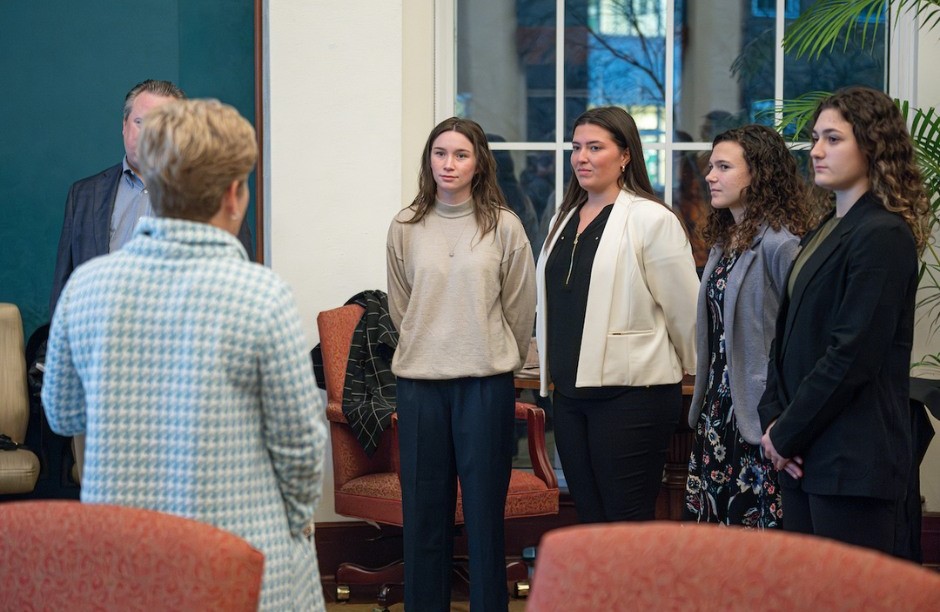Dyer Fellowship Program
The Edgar Dyer Institute for Leadership and Public Policy brings together a group of Coastal Carolina students from all colleges and degree programs to participate in the Dyer Fellowship Program.
Learn More
The Edgar Dyer Institute for Leadership and Public Policy engages students in active learning opportunities where they gain knowledge in various areas of policy research. Students connect academic theory to practice, becoming engaged civic-minded citizens.
Dyer Fellows receive a monthly stipend and their expenses paid for a spring trip to Washington, D.C. They also meet regularly with a dedicated faculty adviser to guide their research throughout the semester.
Apply to become a Dyer Fellow »
Dyer Fellows Travel to Columbia, SC
In January 2024, the Dyer Fellows visited Columbia, SC, where they attended various hearings, meetings, and enjoyed amazing dining and tour experiences. 2024 Dyer Fellow and senior Political Science major Natalie Smith had a great time on the overnight trip:
“We started off the trip at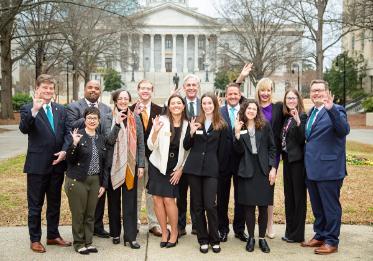 the SC Court of Appeals, where we watched a hearing and toured around the library and other artifacts of the courthouse. Judge Blake A. Hewitt and Mr. Brant Branham were able to join us for lunch at the Palmetto Club proceeding the hearing. We also represented CCU and supported President Benson and other staff in the SC HOR Higher Ed and Technical Colleges Subcommittee meeting.
the SC Court of Appeals, where we watched a hearing and toured around the library and other artifacts of the courthouse. Judge Blake A. Hewitt and Mr. Brant Branham were able to join us for lunch at the Palmetto Club proceeding the hearing. We also represented CCU and supported President Benson and other staff in the SC HOR Higher Ed and Technical Colleges Subcommittee meeting.
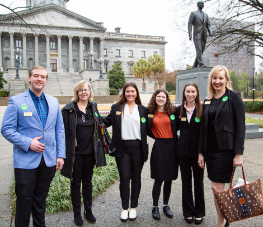
To conclude our trip, we attended the Senate L.C.I. Special Subcommittee meeting. This meeting surrounded an activism effort of Mrs. Kurlowski for passing the S.910 Bill, which proposes regulations on the predatory nature of pay day and installment loans in the state of SC.
Special shoutouts to Mrs. Jacqueline Kurlowski and Mrs. Tanja Warren for planning such an amazing trip for the Dyer Fellows. And an additional thank you to Coastal Carolina University for this opportunity!"
2024 Dyer Fellows
-200x216.jpg)
Natalie Smith is a senior political science major from Queen Annes County, Maryland. Natalie dedicates time to other campus organizations, such as Alpha Delta Pi. During her fellowship, Natalie will propose a regionally focused environmental policy approach to the Chesapeake Bay Watershed. Using an environmental justice lens, Natalie will examine its impact on underserved and underprivileged communities and how equitable solutions can be made to protect this national treasure. After graduation, Natalie plans to enroll in a Master of Public Policy/Juris Doctor program. Research Topic: The Chesapeake Bay Watershed impacts and equitable solutions
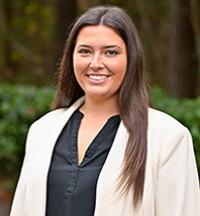
Delaney Kramer is a senior political science major, with a concentration in domestic politics, from Frederick, Maryland. She is passionate about serving others and recently participated in the Governer’s Summer Intern Program. As a Dyer Fellow, Delaney will consider new and innovative ways to reform the public safety system, specifically within law enforcement. Upon graduation, she aspires to work for a government agency in hopes to follow her passion of public service. Research Topic: Reimaging our public safety system with new and innovative polices
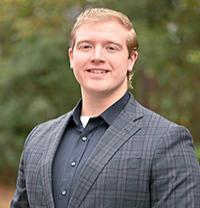
Kevin Caldwell is a senior majoring in psychology involving the study of behaviorism, social psychology, and neuroscience. He is a local to Myrtle Beach, a Magnum Cum Laude graduate of Carolina Forest High School, in addition to being awarded Nathan M. Wolfe Justice Academy nomination. Kevin desires to take on one of the biggest issues of our time: electronic distractions including social media. His focus will be on the use of cell phones or other smart devices in the classroom, and how this affects the lives of staff and students. Kevin will research policy pertaining to attendance and electronic use during lecture., thereby proposing academic policy that allows staff members a range of behavioral approaches to electronic distractions in the classroom, including the use of unexcused absences After CCU, Kevin plans to continue his academic pursuits in psychology and social work. Research Topic: Electronic distractions in the classroom
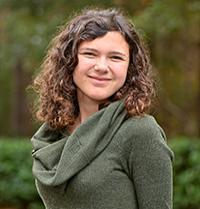
Nicole Scott is a junior from Surfside Beach, South Carolina, majoring in criminal justice and philosophy, and minoring in pre-law. She is passionate about preventing child abuse and domestic violence in hercommunity through education and legislation, and is interested in rewriting legislation to better protect child victims of domestic abuse in custody cases. As a part of the Dyer Fellowship, Nicole will research child protection policies in her birthplace of Wake County, North Carolina. She hopes to develop a policy that gives children a voice in custody cases, either through their own testimony or a guardian ad litem. Her goal is to prevent children from being forced to participate in visitation with abusive or neglectful parents. After graduation, she plans to go to law school and study family court law. Research Topic: How having a guardian ad litem advocating for the child in child custody cases affects children's experiences with child abuse
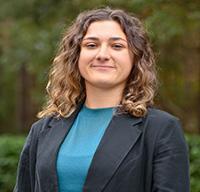
Nevaeh Deichert is a junior from Mantua, New Jersey who is studying intelligence and National security studies with a minor in business administration. She is a member of the HTC Honors College, Chanticleer Intelligence Buera (CIB), and the International Association for Intelligence Education (IAFIE). Nevaeh is very passionate about her work aiming to develop a public policy that gives women the same opportunity as men in the workplace, that will create diverse groups that will help protect the United States National Security. As part of the Dyer Fellowship, shet will research how government agencies discriminate against women in the hiring process and the workplace, and will monitor how agencies can make advertisements aimed towards women. Research Topic: Discrimination against women in government agencies
Research Topics
![]() Sustainability and Environment
Sustainability and Environment
Analysis of southern flood insurance policies
Beach policy analysis of South Carolina
Clean and safe drinking water policies and accessibility
Climate change and flood mitigation in South Carolina
Future of sustainably through community-based tools
Impacts of flooding on socially vulnerable regions of Horry County
Public trust resources and sacrifice zones
Sea level rise in Georgetown County, SC
Single-use plastics and prevention policies
![]() Family, Education, and Poverty
Family, Education, and Poverty
Causal factors of basic need insecurity among college students
Community Development Block Grants in South Carolina
Childhood obesity and the need for recess and physical education
Parental leave and the need for improvements
Teacher retention in South Carolina’s “Corridor of Shame”
![]() Health and Gender
Health and Gender
Examining sexual health education
LGBTQ+ students’ concerns as they enter the workforce
Implications of marijuana decriminalization
Improving health outcomes for rural communities through literacy
Opioid crisis and crime
Opioid overdose prevention policies and their effectiveness
STI prevention on college campuses
Transgender health care policies in the US prison system
Title IX policies/regulations regarding transgender athletes
![]() Elections, Voting, Governance
Elections, Voting, Governance
America’s horizon on energy policy
Election security reform in South Carolina
Firearm regulations and how to close the loopholes
Gerrymandering’s effects on public voting
Inefficiencies and shortfalls of the US Postal Service
Judicial selection vs election
Solving the problem of voter turnout
![]() Media, Privacy, and The Digital Age
Media, Privacy, and The Digital Age
American’s media bias and ‘fake news’ phenomenon
Data privacy, security, and minimization in the US
Exploitation of personal rights and the lack of digital privacy
Media literacy and reducing negative effects of the internet
Privacy laws and their impact on the US intelligence community
Privacy rights in the digital age of autonomous computing systems
![]() Community and Policing
Community and Policing
Community engagement and resiliency
Dismantling the school-to-prison pipeline
Eliminating cash bail in SC
Inequality driven by the cash bail system among minorities
Pedestrian safety and the need for school zones on college campuses
Police brutality effects on mental health
Public transportation solutions for Coastal Carolina University



